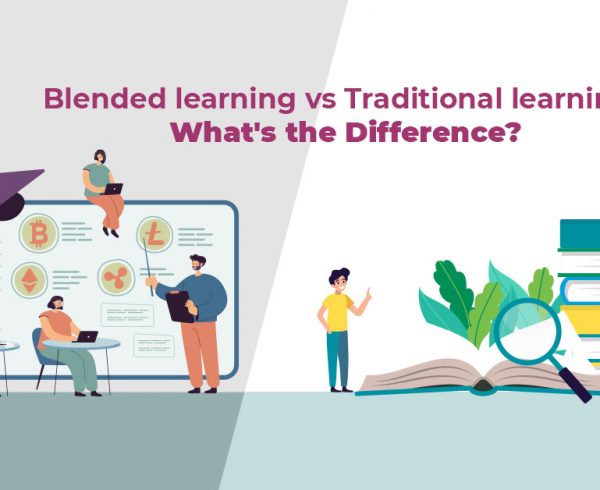As the world goes digital, the eLearning sector too has evolved to embrace online tools to make learning more engaging, relevant, contextual and immersive. The World Wide Web has made a wealth of information available at our fingertips. No longer are learners restricted to a unidimensional experience of learning with a flow of information from the teacher to the teacher.
Learners, today, are more aware, more demanding and less prone to accept anything at face value. On the flip side, the attention span of the digital generation is waning. With smartphones in their hands, these learners want information anywhere, anytime and with just a few clicks of a button. Rich media formats such as video/audio files, Augmented Reality and Virtual Reality are now being used to hold the learner’s attention span and make learning more engaging and effective.
Know More: Blended Learning Approach for Enterprises
This being said, technological advancements cannot replace human interaction. Learners need basic guidance and a sense of context and direction to interpret online lessons, which only a human instructor can provide. While it is good to have access to learning material on the move, instructor-led team learning in the confines of a physical classroom is essential to collate different skill sets and ensure team learning for optimal results.
The rapidly changing landscape simply means that education and training practices should incorporate the best of both worlds – the virtues of traditional classroom settings and the advantages of the online world. This has given rise to the concept of blended learning, which is a hybrid model that includes online and traditional learning methods.
This type of learning incorporates both the human component and the rich use of eLearning resources. Blended learning ensures that the learners can drive their own learning experience through engaging, contextual and relevant learning resources available online. Besides, it also incorporates the role of an instructor for human interaction, brainstorming, team learning, etc.
There are different types of blended learning models, such as:
Online: An instructor delivers lessons via an online platform using eLearning resources complemented by periodic face-to-face meets.
Rotation: Students switch between self-paced learning and classroom learning.
Flexible: Most learning takes place through the online platform, but instructors provide additional support through small group settings.
Online Lab: The learners come together in a physical classroom and an online teacher delivers the lessons with the help of an onsite professional.
Personalized Blended Model: This model straddles the physical and virtual spaces based on learner needs.
Self-blended Model: Students take online classes to supplement their classroom learning.
Face-to-face Learning: Lessons are delivered using online media by an onsite instructor.
Top 10 Advantages of an Effective Blended Learning
1. Increase Student Interest:
A blended learning environment allows learners to ‘see’ concepts in real-world settings in a virtual environment. The context and practical implementation of the concepts increase student interest and make learning more interesting and immersive. Online resources help to bring alive subjects such as Mathematics and Science that are either difficult or monotonous and also help to improve information retention.
2. Increase Focus:
The attention span of the millennial generation is decreasing. With plenty of online content available on smartphones, users are free to view whatever content they want as long as it holds their attention. When technology is integrated into lessons, learners are more likely to remain focused on a subject for longer periods than they would be with books and paper resources.
3. Learning Through Exploration and Research:
Students can reinforce the lessons taught in the classroom through exploration and research. Given the vast amount of online resources available, students can access them on their own to go deeper into the subject. Basically, blended learning provides a degree of autonomy to the students, allowing them to take charge of their own learning and set their own learning goals.
Know More: Check out Blended Learning Approaches & its Solutions
4. Learning by Doing:
Classroom teaching can sometimes be learning by rote, given that students are limited to the knowledge provided by the instructor. However, in blended learning, instructors can motivate the students with projects that involve going beyond the confines of the classroom and learning by doing. This also improves their research skills and ability to find the resources they need to reach their goals.
5. Promoting Learning Anytime and Anywhere:
While students are introduced to a lesson in a classroom, using their smartphones and laptops or other platforms, they can learn anytime and anywhere to supplement classroom lessons.
6. Gaining Access to Global Resources:
Again, learning is not restricted to the instructor, textbooks and peer interactions. The learners can access global resources and materials that meet their level of knowledge and interest.
7. Self-paced Learning:
One of the greatest weaknesses of traditional classroom settings is that it does not address individual learner and retention needs. Not all students have the same ability to grasp and retain concepts. A blended approach ensures that students who lag in class can use online resources for greater clarity. Similarly, quick learners can also progress to the next level. Therefore, blended learning helps to reduce stress, increases satisfaction and information retention.
8. Allows Diagnostic Information and Student Feedback:
Online assessment resources allow the instructors to rapidly analyze, review and give feedback to students. Besides, they can use this data to tailor their teaching methods and feedback for each student while improving time efficiency.
9. Greater Interaction with the Instructors:
Interaction with the instructor is not limited to the classroom. Students can use resources such as emails, discussion boards, annotations, highlights and chat rooms.
10. Prepares Students for the Future:
Blended learning offers a means to build skills for real-world settings, such as research skills, self-learning, and self-engagement, help to develop a ‘self-driving force’, better decision-making, a better sense of responsibility, and computer literacy.
All said, blended learning results in:
- Individual self-paced learning
- More engaged students
- Better information and feedback on work
- Team learning and teaching
- Extended time with students
- Focus on deeper learning
- Individualized professional development plans
- More opportunities for collaboration
- Meaningful professional development
Conclusion
Organizations are increasingly realizing that blended learning, that is, a mix of both traditional and online learning, is the best way forward. While online learning provides learners with the opportunity to learn at their own pace, anytime, anywhere, and also hone their skills through simulations and gamification; coaching and mentorship programs in traditional classroom settings provide the much-needed human interaction and more opportunities for communication and brainstorming with both mentor and peers when working towards a common goal.
Know More: Blended Learning Model to Create Content
Need to know more about our Products & Services? Drop us a note at marketing@hurix.com.











